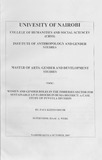| dc.description.abstract | This work examines the women and gender roles in the fisheries sector amongst the
fishing community of Busia district. The study analyzed fishing as a human activity,
which enables the fishing community of Busia district to ensure food security and
enhanced livelihoods. The aim of the study was to look at the socio-cultural and
structural factors, which deprive women opportunities in controlling the sector. The
results of this study were to be used in enhancing a sustainable fishing activity for both
men and women.
The study population comprised of adult women and men engaged directly or indirectly
in fishing activities for food security and for sustaining their livelihoods. The probability
and none-probability sampling techniques were used in selecting (100) participants. The
questionnaires and key informants guide were used for data collection. This being a
qualitative study; the data was sorted out, interpreted and described in the context of the
study objectives and study questions.
The research findings suggest that towards sustainable livelihoods amongst the fishing
community of Busia district the roles of man and woman would be necessary in the
sector. The study found out that women's rights, privileges and opportunities in the
fisheries sector are subordinated by the society. The traditional and cultural, social and
religious norms and values coupled with political and economic factors contribute to the
subordinations subjected to women's activities. These have prevented women from
effective participation equally with their men counterparts in sustainable utilization of the
communal resources.
The study recommended that for effective food security and sustainable livelihoods;
emancipation of women in the fisheries sector is primary. This requires looking into
gender relations and positions to create equalities in engaging women in development
strategies and policy making, organizations, institutionalized credit and financial systems
to be beneficial to women and men initiatives. | en |

